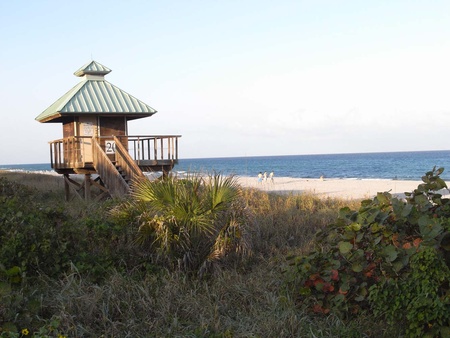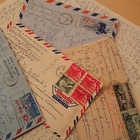Morikami Sukeji, who traveled to the United States as a member of the Yamato Colony in South Florida and stayed there alone until the end of his life after the colony was dissolved, continued to write letters to his sister-in-law and her family after the war. His days were filled with carefreeness and loneliness, and he worked hard at farm work, remembering the cherry blossoms he had seen in Kyoto. Even though he was in Florida, he dreamed of traveling to South America someday.
* * * * *
May 17, 1951
<Japanese food is the best>
Mi-san,
I am in perfect health. For the past two weeks, I have been doing nothing but sleeping day and night. I am exhausted and tired, and my whole body is heavy and I am half-sick. There are still two more months before I can start the autumn harvest. I have to take care of my farm tools, repair the house, and till the farm (plowing and removing weeds).
I cook for myself. I eat what I want (not Japanese food), when I want to eat, and lead a simple life close to nature. I don't have the ease of living alone, nor do I have to follow etiquette.
I sit on the doorstep in my underwear, eating from a frying pan with a spoon while watching the cat and the fields. I'm tired of restaurant food. I'm Japanese after all. When I don't have much of an appetite, I want to eat pickles. Fish is quite plentiful here, but it's expensive and perhaps because of the climate, it doesn't taste like the food I had in Japan.
When I was a child, I loved fishing, and I used to skip school to go fishing, knowing that I would be locked up. I used to get up in the middle of the night and go to the beach at Kurita (in Miyazu), which is about four or five ri away. From here, you can go by car and fish in the Atlantic within half an hour, but I don't feel like it. But this summer I'm going to try a little in the nearby canal. There are a lot of small fish, though.
"South America is a place of longing"
Delray Beach has been a little quieter lately. All the winter visitors have left, and the locals who can afford it have all gone to summer vacation. I like traveling too, but it's always inconvenient for me, so I haven't been able to go anywhere for about 10 years.
However, I would love to travel with you in a car through Central America and South America at least once in my life. South America is my dream country, and when I see young people there, I can't help but feel envious and wish I were 10 years younger.
In this country, too, the voices of people complaining about the difficulty of making a living are gradually getting louder. For farmers in particular, the things they can buy are expensive and the things they can sell are cheap, and the balance is not good.
Mi-san, today's newspaper said that the Chinese Communist Army has made a comeback (in the Korean War). I wonder when the Korean War will end, which is like a game of tag. Sooner or later, I think it will become a world war. The majority of people agree with MacArthur's theory.
GEO
July 1951
<This summer there will be a bumper crop of watermelons>
Beauty
It's been a while since I last wrote. Today is Sunday, and the rain that started falling this morning doesn't seem to be stopping anytime soon. In recent years, the southern states of the United States, except for Florida, have been hit by rare heat waves and droughts, causing great damage to crops, with some areas almost completely destroyed. Fortunately, crops that had irrigation facilities are thriving and lush.
I am currently experimenting with 10 varieties of water melons and melons. Six of the seedless water melons you sent have grown, and the baby ones are around 12 or 13cm tall. I wonder how the water melon seeds turned out. I think they have probably been planted. I had plenty of water melons throughout the summer, so I ate as much as I could.
Well, reluctantly, we Japanese have been granted the right to naturalize, and now we can stand on the same level as everyone else. The newspapers here have not said a word about this. I learned about it for the first time from the newspaper you sent me. I have not yet decided whether I will naturalize. Even if I decide to return to my home country, naturalization is not necessary. Most of the first generation are over 60 years old, and I don't think many of them want to naturalize.
<I was surprised when I looked in the mirror for the first time in a while>
Thank you for the photos. I'm glad you're all doing well. I'm in great health too. I've lost a little weight. I seem to be surviving on water and watermelon. The other day I looked in the mirror in town. To my surprise, most of the hair I had left was gone, and my brown cheeks looked gaunt. I was totally disappointed.
If I were to meet Mi-san with a face like that, my ten-year love would fade in an instant. ...I became anxious. I never use mirrors. There is not a single mirror in the house. We used to have one, but it was broken in a storm two years ago. I think it was a billionaire rock fellow, but shortly before he died, he looked at the firm arms of a young man and lamented that he would give everything he had if it would bring back his youth.
I want to buy a sewing machine for Reiko, but how much does it cost to buy one made in Japan? It's quite cool today thanks to the rain, and the temperature doesn't exceed 80 degrees (about 27 degrees Celsius).
* * * * *
Dear Mi-san, today is the American Independence Day, so I'm off work. I'm going to write you a letter. I found the baking book you requested, so I'm sending it to you. There's nothing different here. There have been some evening showers for the past few days, so it's a little cooler at night. The kitten has also become plump and round. Its eyes have opened now, and it's wobbly walking around. I haven't given it a name yet.
March 1952
Dear Mi-san, March is already in the middle. I think the cherry blossoms in Arashiyama (Kyoto) are nearing their peak. I think back 46 years, in 1906, when I spent some time in Kyoto to recuperate my eyes. I remember visiting Arashiyama at the end of the month, when the flowers had already fallen and there were only green leaves. On the way, I saw some women washing vegetables in a basin. The vegetables in Kyoto looked good, but they didn't taste as good as the ones my mother made.
The city's largest store is bustling with several hundred customers. All the products are price-tied and self-service. Ladies come to buy, fighting over the price of a cent or two. One woman, who appears to be visiting to escape the winter, is picking up each eggplant, looking at them one by one, still unable to make a decision. Standing nearby, I say, "Ma'am, let me help you," and the lady smiles. I pick up one and say, "When buying eggplants, choose ones that are shiny, soft, and as light as possible for their size. Hard, heavy ones have a lot of seeds."
I heard that the woman came from Alaska, where eggplants don't grow, and she thought the heavier the better.
Dear Mi-san, I can't hear anything. Probably because of the cold. It's late at night. Let's sleep tonight dreaming of becoming very rich. On the night of March 16th, my dear Mi-san
(Titles omitted)
Reference: Yamato Colony and Morikami Sukeji. From "Yamato Colony: The Men Who Left Japan in Florida" (by Kawai Ryusuke, Shunposha)
© 2019 Ryusuke Kawai







